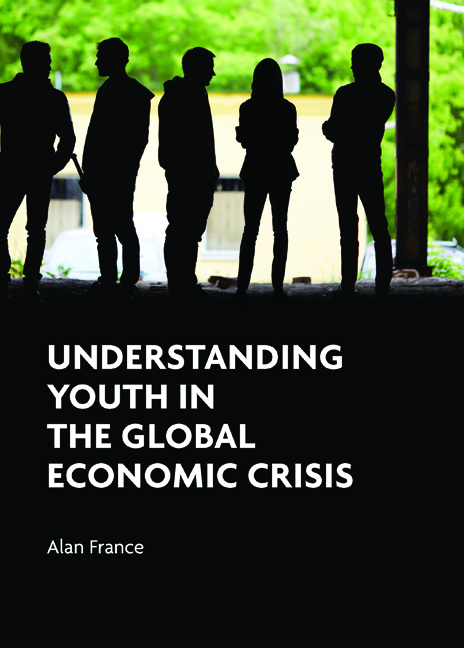Book contents
- Frontmatter
- Dedication
- Contents
- List of tables and figures
- About the author
- Acknowledgements
- Introduction
- One A political ecology of youth
- Two The global crisis and the ‘age of austerity’
- Three Education and training: the broken promise
- Four Education and training: from public good to private responsibility
- Five Unemployment and work: precarious futures
- Six NEETs and the disengaged: the ‘new’ youth problem
- Seven Divergence and difference: contrasting cross-national experiences of being young
- Eight Education, work and welfare in diverse settings
- Nine Youth and mobility: inequality, leaving home and the question of youth migration
- Ten After the crisis: social change and what it means to be young
- References
- Index
Two - The global crisis and the ‘age of austerity’
Published online by Cambridge University Press: 01 September 2022
- Frontmatter
- Dedication
- Contents
- List of tables and figures
- About the author
- Acknowledgements
- Introduction
- One A political ecology of youth
- Two The global crisis and the ‘age of austerity’
- Three Education and training: the broken promise
- Four Education and training: from public good to private responsibility
- Five Unemployment and work: precarious futures
- Six NEETs and the disengaged: the ‘new’ youth problem
- Seven Divergence and difference: contrasting cross-national experiences of being young
- Eight Education, work and welfare in diverse settings
- Nine Youth and mobility: inequality, leaving home and the question of youth migration
- Ten After the crisis: social change and what it means to be young
- References
- Index
Summary
Introduction
We are all familiar with the economic crisis of 2007. This was the ‘mother of all crises’ (Harvey, 2010, p.6) yet, as history shows, economic crises are not unusual in the history of capitalism. Evidence suggests there have been hundreds of crises around the world since the 1970s: it is suggested there have been 146 banking crises, 218 currency crises, and 66 episodes of sovereign debt crisis (Laeven and Valencia, 2012). Even the Financial Times, discussing an International Monetary Fund (IMF) report, suggested that there had been 132 countries that had experienced ‘macroeconomic or financial crisis’ between 1980 and 1996 (Bevins and Cappitt, 2009).
Not all of these crises have been global, although what constitutes a ‘global crisis’ remains unclear in the literature. It is suggested that a global crisis, while having its epicentre in national economies, will have a wider impact on a number of other economies. How far they reach into the ‘global’ and how much impact they have remain problematic in any definition, although it has been suggested that between the 1970s and the recent 2007 crisis there were in fact four major crises that had a global impact (Tapia, 2013). These are: the 1970s oil crises; the 1980s US monetary crisis; the 1990s collapse of the USSR economy; and the multiple crises in South East Asia and South America in 2000 (Tapia, 2013). Again, how far these were truly global can be debated: as we shall see in the discussion that follows, the 2007 crisis far exceeded the global impact and reach of all these other crises. It is clear that the 2007 crisis touched every economy worldwide and, while some have been more affected than others, it can be seen as truly global in its reach. It is in this context that the 2007 crisis is usually compared with the other major economic crisis that caused the great depression of the 1930s. As a result, what followed after the 2007 crisis is now called ‘the great recession’.
This chapter will provide an understanding of the political ecological framework that has been shaping the ‘youth question’ over the last twenty years.
- Type
- Chapter
- Information
- Understanding Youth in the Global Economic Crisis , pp. 37 - 60Publisher: Bristol University PressPrint publication year: 2016



